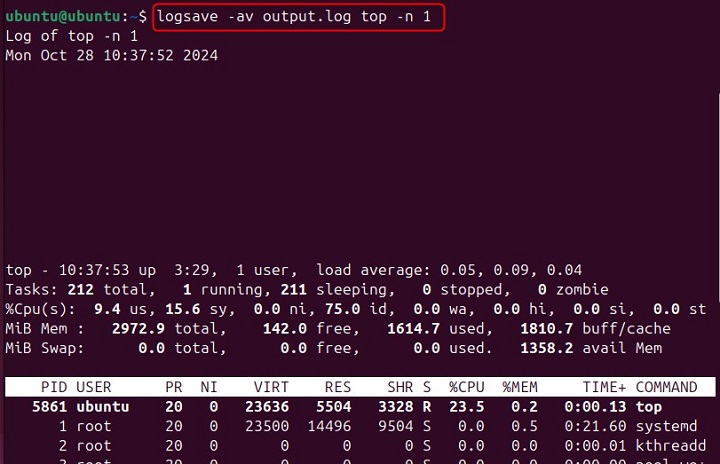
logsave Command in Linux
logsave is a Linux command that allows you to capture output from various programs and save it to a log file. It's like a digital tap recorder for your command-line output. For instance, you can use the logsave command to store the output of a system update or a script run, which is useful for troubleshooting or keeping records. Basically, it wraps around another command, runs it, and saves whatever that command spits out to a file you specify.
Table of Contents
Here is a comprehensive guide to the options available with the logsave command −
Syntax of logsave Command
Here's the standard way to write the logsave command in Linux −
logsave <logfile> <command>
- <logfile> is where you want to save the output.
- <command> is the command whose output you want to capture.
logsave Command Options
Below are a few options that can be employed with the Linux logsave command −
| Options | Description |
|---|---|
| -a | Append the output to the log file instead of overwriting it. |
| -s | Send output to standard error (stderr) in addition to the log. |
| -v | Produce verbose output; show what's being logged in real-time. |
Examples of logsave Command in Linux
Let's take a look at some practical examples of the command logsave on Linux system −
- Basic Example
- Appending Output
- Real-Time Output
- Combining Options
- Capturing Error Messages
Basic Example
Suppose you want to run the ls command and save its output to a file called output.log. The basic logsave command will look like this −
logsave output.log ls
This command will create a new file named output.log (or overwrite it if it exists) and store the list of directory contents in it.

Appending Output
If you want to append the output of a command to an existing log file without overwriting it, you can use the -a option. For instance, if you want to append the output of the df command to the same output.log file, you would use −
logsave -a output.log df
This way, the output of the df command will be added to the end of the existing output.log file.

Real-Time Output
If you want to see the command's output in real-time while it is being logged, you can use the -v (verbose) option. For example, to run the ps command and see its output on the screen while it's being saved to a file, you would use −
logsave -v output.log ps
With this option, the output of the ps command will be displayed on the screen and simultaneously saved to output.log.

Combining Options
You can also combine multiple options. For example, if you want to append the output of the top command to a log file and see the output in real-time, you can use both -a and -v options together −
logsave -av output.log top -n 1
Here, top -n 1 runs the top command just once, and its output is appended to output.log while also being displayed on the screen.

Capturing Error Messages
Sometimes, it's important to capture error messages along with the command's output. You can use the -s option to send the output to standard error (stderr) in addition to the log file. For example, to capture the output and error messages of a script called myscript.sh, you would use −
logsave -s output.log ./myscript.sh
This way, both the output and any error messages from myscript.sh will be saved to output.log and displayed on the screen.
Conclusion
logsave is an essential tool for Linux users who need to capture and preserve the output from various commands. Whether you're updating your system, running scripts, or troubleshooting issues, logsave wraps around your commands, executes them, and saves the results to a specified file.
In this tutorial, we covered the syntax of the logsave command, various options available, and provided practical examples to illustrate its use. Mastering logsave will certainly enhance your Linux command-line efficiency and aid in maintaining thorough records of your operations.